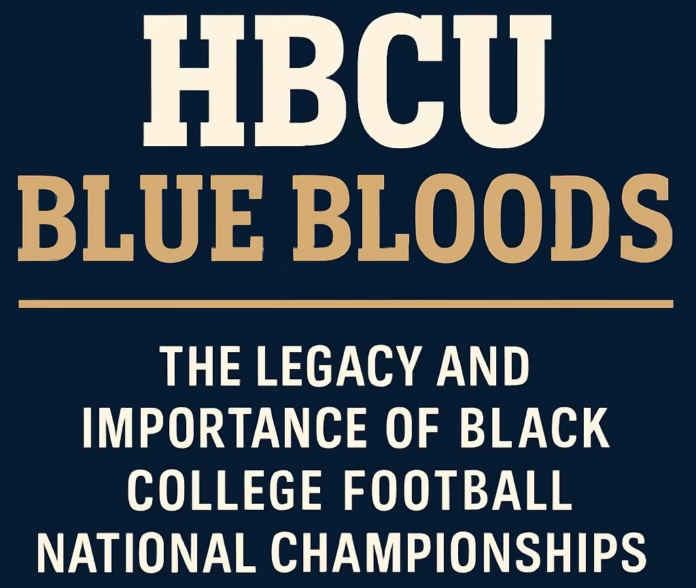HBCU Blue Bloods and the Black College Football National Championship Legacy
When we talk about dominance, tradition, and legacy in college football, the conversation isn’t complete without the legendary HBCU programs that have ruled the gridiron for generations. Programs like Grambling State, Tennessee State, Florida A&M, Southern University, and Tuskegee have not only produced NFL legends but also built dynasties by winning Black College National Championships — a vital part of African American sports history.
Why Black College National Championships Matter?
Before integration allowed Black athletes widespread access to predominantly white institutions (PWIs), HBCUs were the epicenter of Black college football excellence. The Black College National Championship (also known as the HBCU National Title) wasn’t just a crown — it was a symbol of pride, achievement, and dominance for institutions that gave Black athletes an opportunity to shine when few others would.
These titles provided national recognition to teams that would have otherwise been ignored by mainstream media and rankings. Today, they serve as historical reminders of resilience, excellence, and pride in Black college sports culture.
Grambling State: The Standard of Greatness
Grambling State University, under the legendary Coach Eddie Robinson, became synonymous with success. With over 400 career wins, Robinson turned Grambling into the most recognizable HBCU football program in the country. The Tigers have claimed 15 Black National Championships and sent over 200 players to the NFL, including Super Bowl MVP Doug Williams.
Grambling isn’t just a team — it’s a movement. Their influence stretches far beyond Louisiana, and their championship banners are a testament to the program’s elite pedigree.
Tennessee State: Quiet Dominance in the East
Often overshadowed by their SWAC counterparts, Tennessee State University has quietly built one of the most successful legacies in HBCU football history. With 12 Black National Championships and multiple undefeated seasons, the Tigers have long been a force in the OVC and beyond.
TSU also boasts a long list of NFL legends like Richard Dent and Ed “Too Tall” Jones, proving that excellence isn’t confined to one region. Tennessee State’s championships are a vital part of the Black college football story.
FAMU: The First and the Fiercest
Florida A&M University changed the game in 1978 by becoming the first and only HBCU to win the NCAA Division I-AA (now FCS) National Championship. But long before that, the Rattlers had established dominance with a dozen Black National Championships and decades of excellence under legendary coach Jake Gaither.
FAMU’s place among HBCU Blue Bloods is undisputed — not just for their titles, but for setting a national standard of competitiveness and innovation.
Tuskegee: The Hidden Giant
While Grambling and FAMU often dominate headlines, Tuskegee University quietly holds one of the richest legacies in HBCU football history. The Golden Tigers have claimed more Black National Championships (29 recognized by some historians) than any other HBCU program.
With roots dating back to the early 1900s, Tuskegee’s dynasty was built on discipline, community pride, and consistent success in the SIAC. Their impact is undeniable, even if often underappreciated in mainstream discussions.
Southern University: Baton Rouge’s Crown Jewel
The Southern Jaguars are known for passionate fans, high-level talent, and a tradition of winning. With 9 recognized Black National Championships, Southern has been a consistent power in the SWAC for decades.
The Jags’ fierce rivalry with Grambling in the Bayou Classic has often served as a de facto national championship game, with fans and scouts alike tuning in to witness elite HBCU football at its best.
Preserving the Championship Legacy
While HBCU programs have faced funding disparities, conference realignments, and media exclusion, the importance of Black College National Championships must be preserved and celebrated. These titles are more than trophies — they represent legacy, pride, and the undeniable impact of HBCUs on college football history.
With renewed attention on HBCU sports, it’s critical that fans, media, and institutions honor the champions who paved the way. Programs like Grambling, Tennessee State, FAMU, Tuskegee, and Southern didn’t just win games — they made history.
Conclusion: Blue Bloods That Built the Game
The next time a conversation about college football greatness comes up, remember the HBCU Blue Bloods. They didn’t just participate in history — they made it. And their Black National Championships stand as proof that excellence comes in many colors, traditions, and campuses.










